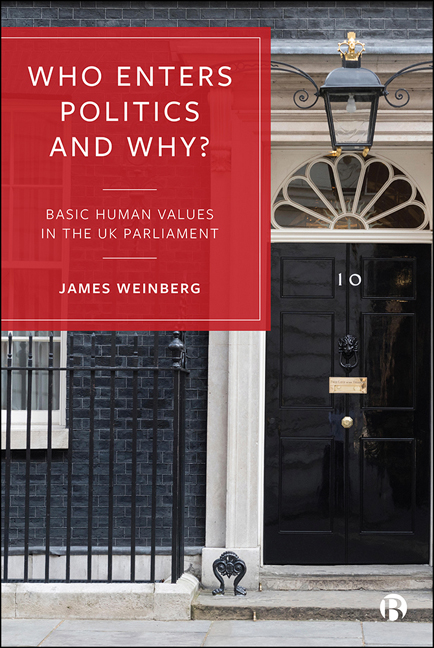Book contents
- Frontmatter
- Dedication
- Contents
- List of Figures and Tables
- Note on the Author
- Acknowledgements
- 1 Why Do We Hate Politicians?
- 2 Psychological Scrutiny: Who Enters Politics and Why?
- 3 All the Same! Demographic Homogeneity and Careerism
- 4 Basic Values and Partisanship
- 5 Parliamentary Behaviour: Personal Choices, Political Results
- 6 Perfect Politicians? Voting Preferences in the United Kingdom
- Notes
- Appendix A Twenty Item Portrait Values Questionnaire (TwIVI)
- Appendix B Confirmatory Factor Analysis of Survey data on the Basic Values of Politicians (UK Members of Parliament, N = 168)
- Appendix C External Correlations Across Samples
- Appendix D Conjoint Experiment of Candidate Preferences by Partisanship
- References
- Index
5 - Parliamentary Behaviour: Personal Choices, Political Results
Published online by Cambridge University Press: 12 March 2021
- Frontmatter
- Dedication
- Contents
- List of Figures and Tables
- Note on the Author
- Acknowledgements
- 1 Why Do We Hate Politicians?
- 2 Psychological Scrutiny: Who Enters Politics and Why?
- 3 All the Same! Demographic Homogeneity and Careerism
- 4 Basic Values and Partisanship
- 5 Parliamentary Behaviour: Personal Choices, Political Results
- 6 Perfect Politicians? Voting Preferences in the United Kingdom
- Notes
- Appendix A Twenty Item Portrait Values Questionnaire (TwIVI)
- Appendix B Confirmatory Factor Analysis of Survey data on the Basic Values of Politicians (UK Members of Parliament, N = 168)
- Appendix C External Correlations Across Samples
- Appendix D Conjoint Experiment of Candidate Preferences by Partisanship
- References
- Index
Summary
‘I have no idea and I quite often wonder this, how people that are kind of 40 years my senior manage to do this because I regularly miss meals, I don't get nearly enough sleep, I do an incredible amount of travelling on aeroplanes, which are not the healthiest kind of way to travel. I don't understand how people who are much older than me can manage to put themselves through this, just even physically, if nothing else.’
Scottish National Party MP (Interviewee 7)At the heart of imaginative and effective political science is a desire to comprehend the ‘why’ behind political behaviours and decision making. So far this book has analysed unique data on the basic values of UK politicians to demonstrate that they are psychologically distinct from one another, the general public and their electors. However, public dissatisfaction with British politics often reduces to internalized preconceptions about the immorality or corruption of MPs’ political behaviour (Bowler and Karp, 2004; Allen and Birch, 2015b). In order to understand (a) how MPs interpret and respond to the formal and informal institutions of elite politics and (b) the extent of their personal agency in politics, this book now turns to examine the relationship between basic values and parliamentary behaviour. A rigorous extant literature has iterated the importance attached to values as central aspects of the self and as behavioural codebooks (eg Rokeach, 1973; Schwartz, 1992; Feather, 1995; Verplanken and Holland, 2002; Bardi and Schwartz, 2003). There is no reason, then, why this same logic should not help to illuminate the behavioural decisions and intentions of our political elites, especially those behaviours that are planned and temporally free from immediate constraint (see Eyal et al, 2009).
In addressing the second overarching ‘problem’ posed in this book – Do politicians’ personal characteristics matter for their behaviour once they are elected to parliament? – this chapter makes a theoretical and an empirical contribution. It starts by reviewing the landscape of existing parliamentary studies in the UK and makes the case for a more holistic model of elite political behaviour that accounts for psychological as well as institutional explanations. In particular, it argues that the latter circumscribe, but do not eliminate, individual discretion. Data on MPs’ basic values are then used to evaluate political agency in contexts of varying institutional constraint.
- Type
- Chapter
- Information
- Who Enters Politics and Why?Basic Human Values in the UK Parliament, pp. 107 - 144Publisher: Bristol University PressPrint publication year: 2020

